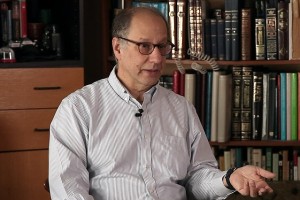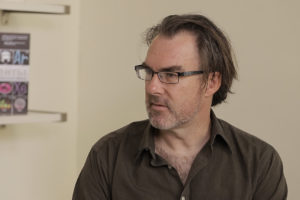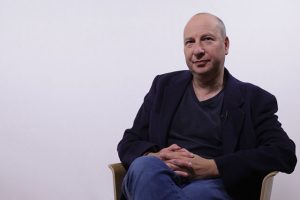Changing Nature of Knowledge in the Internet Epoch
Harvard Senior Researcher David Weinberger on how filtering on the Internet is organized, and the web of knowl...

Who is an expert? In sociology, several approaches exist to answer this question. One traditional approach defines an expert as a person occupying a specific position within a social structure. We can then describe the position, how it is acquired, and how experts are recruited. This approach follows a familiar structuralist and politicized logic. Another more radical approach argues that there is no such thing as expert knowledge, only expert statements. An individual becomes an expert not because of what they know but because someone asks them a question as if they are an expert.
A remarkable example of this occurred on BBC. During a discussion on the internet and freedom of use, an assistant mixed up the waiting rooms and brought Guy Goma into the studio instead of Guy Kewney. Kewney was an expert on internet downloading and legal regulation, while Goma was an African immigrant applying for a job as a systems administrator. Goma found himself in the studio and answered the presenter’s questions so well that no one suspected he wasn’t an expert on legal regulation. Ultimately, he didn’t get the systems administrator job because he was an African immigrant. This is a vivid example of how expertise is created in the very process of asking questions.
We are not interested in structuralists who discuss social structure or radical critics who discuss expert statements. Instead, we want to understand what expert knowledge truly is. Phenomenological sociology—thanks to Alfred Schütz, the Austrian sociologist, and his study of the “well-informed citizen,” along with his successors Thomas Luckmann and Peter Berger—provides a useful resource for this.
To illustrate a basic conceptualization of expertise, I’ll share a personal experience. While working in the Balkans, all observers, especially long-term ones who had to move between warring factions, were given maps of minefields left over from military conflicts. The first question an observer asks when receiving a map showing the exact locations of mines is: “Who made this map?” I asked the mission leader—in Bosnia and later in Albania—and they told me, “That person over there.”
The person was a former field commander who had placed the mines and thus knew their locations well. When I asked, “Isn’t it a problem that a former field commander is working for the OSCE mission?” they responded, “Very few people are still alive who know where the mines are, and most of them are who laid them. So, we have a choice: either our observers will get blown up, or we work with former field commanders.” This man was a pure expert because he knew that due to his special relationship with the object of expertise, he had been directly involved in laying the mines and knew better than anyone else where they were.
On the other hand, the field commander also had unique relationships with decision-making centers. He was a figure defined by his relationship with the object and those who make decisions about that object. When we talk about how the space of expertise is formed, an expert is not someone public; an expert is someone who knows the subject because they once immersed themselves in it, dedicated a significant part of their life to it, and then emerged from it with the ability to view it from a distance.
At the same time, the expert is in a particular relationship with political decision-making centers. Since my time in the Balkans, expertise has always seemed somewhat linked to terrorism and blackmail, and perhaps this applies not only to the Balkans.
Assuming two types of relationships form expert knowledge, we can explore how expertise evolved in the 20th century. Initially, expertise gained special status through military centers, where the cost of error was very high.
The story of Abraham Wald, a Hungarian mathematician, is well-known. Military officials asked him where additional armor should be placed on aeroplanes, as new technologies allowed for extra protection without significantly increasing weight. Wald looked at the data, laughed, and said, “You’ve compiled a table of hits based on the planes that made it back, and now you’re armoring the places where those planes were hit. But if a plane was hit in the wing and still managed to return, then the wing doesn’t need extra armor. Look at the places that aren’t in your table, and armor them—because hits there prevented the planes from returning.” This is the so-called “survivorship bias.”
What’s essential in this model is that Wald was a scientist—he knew statistics but nothing about airplanes. Those who study the sociology of mathematics know well what sequential analysis or Wald’s analysis is. He could comment as a scientist but not as an expert.
There is a famous story about two of Churchill’s advisors: one invented radar, and the other was Churchill’s friend. Despite the inventor’s argument that bombing German cities was unnecessary because the cost of the bombs exceeded the damage inflicted, the second advisor insisted. In the end, bombing became the primary strategy.
In the 20th century, a third set of relationships emerged: those with the media. The primary audience for experts became not decision-makers but the broader public, which could be sold knowledge to enhance the expert’s symbolic status. Even decision-makers could no longer ignore symbolically significant experts, even if their actual knowledge of the subject was dubious. This was especially true when the main distributors of hype and symbolic capital were not the people connected to the object or responsible for political decisions but the media.
This is called the “proliferation of expertise under media influence,” where a journalist calls a prominent loneliness expert who has written a remarkable work on loneliness. After discussing the problem of lonely people, the journalist unexpectedly asks, “By the way, something is going on with North Korea’s missiles. As a sociologist, could you comment on what’s wrong with North Korea?”
Without batting an eye, the loneliness expert begins to explain that North Korea is very lonely, has no friends, and has no foreign policy allies, and expands its theory of loneliness to North Korea. In Russia, there is a prominent North Korea specialist, Andrei Lankov, but why make two calls when you can just ask one person everything? The expert now becomes a specialist in North Korea—this is the proliferation of expertise.
There is another exciting aspect that is not tied to the influence of the media. Although we can’t limit ourselves today to the two initial types of relationships, we must also consider this third set of relationships—relationships with the general public and the media.
There is a curious phenomenon of expert revolution. The initial model of expertise involved decision-making centers, which, as bureaucratic structures became more complex, surrounded themselves with a protective layer of servicing organizations—a layer of bureaucracy tasked with selecting experts. Loyal experts who say precisely what is expected of them are preferred.
In the next stage, experts who have gained access to decision-making centers begin accumulating political weight, bypassing bureaucracy, and obtaining direct access to key decision-makers, acting as advisors. As a result, they replace bureaucratic organizations, allowing them to distribute expert tasks to themselves. An expert revolution occurs when experts become bureaucrats hiring other experts, often themselves or their former students.
On the one hand, mediatisation leads to the proliferation of expertise, where one person becomes an expert on everything. On the other hand, the expert revolution sees the expert becoming a significant political figure, replacing the bureaucratic intermediaries between themselves and decision-makers.
Initially, experts didn’t have their language. They were outsiders, speaking the language of the object they had long been a part of, capable of explaining it in a way non-experts could understand. If you take someone out of an object, they speak the object’s language, but they won’t understand your questions, and a distance from the object is necessary.
At the same time, an expert knows the language of those they address regarding the object. As a result, the language of expertise becomes a strange pidgin—a mix of pseudo-scientific statements, references to Machiavelli or current leftist theorists, followed by common-sense observations, and then statements in the language of political theory. Thanks to the media’s influence, we see the creolization of languages—a new expert language emerges, with its own rules, distinct from the language of the object and the language of politics connected to that object.
In science, the creolization of languages is quite intriguing because expert pidgin starts to be perceived as a scientific language. When you extract someone from science who speaks the language of their field, which only their academic community understands, they initially try to speak the language of science, and no one understands them. Then, they forget that language and begin speaking in everyday terms.
Today, this strange pidgin is starting to be recognized as the language of science. In a sense, the phenomenon of enlightenment and popularization is tied to the emergence of a semi-peripheral language around the language of science. Not all disciplines have developed this “Saturn’s ring” yet, and not all fields today have a layer of expert jargon.
Social and natural sciences are at the forefront. Mathematics, for example, hasn’t yet acquired this kind of pidgin. If, in the past, we spoke of competition between bureaucrats and experts, today we see a new competition—between experts and scientists. This is a new chapter in the evolution of expert knowledge.

Harvard Senior Researcher David Weinberger on how filtering on the Internet is organized, and the web of knowl...

Art historian Jeffrey Taylor on the art market, the ‘American Leonardo’ and why connoisseurship doesn't work i...

Philosopher David Edmonds on relationship between moral philosophy and robotics, artificial intelligence and e...